
Malaysian Journal of Music
Scope & Guideline
Unveiling the Melodies of Tradition and Innovation
Introduction
Aims and Scopes
- Interdisciplinary Research in Music:
The journal encourages research that intersects music with other fields, including education, psychology, sociology, and culture, promoting a holistic understanding of music's impact. - Cultural Studies and Musicology:
A significant focus on the cultural aspects of music, including ethnomusicology and the study of music traditions, practices, and their meanings within specific communities. - Pedagogical Innovations in Music Education:
The journal emphasizes innovative teaching methods and strategies in music education, exploring how educational practices can evolve to meet contemporary needs. - Community Engagement and Music:
Research that examines the role of music in community settings, including its impact on cultural heritage preservation and social cohesion. - Technological Advancements in Music:
An exploration of how technology influences music creation, performance, and education, reflecting the changing landscape of the music industry.
Trending and Emerging
- Music and Technology Integration:
The integration of music with technology is increasingly prevalent, covering topics such as digital instrument design and innovative pedagogical approaches using technology. - Cultural Identity and Music:
Research focusing on cultural identity through music has gained traction, highlighting how music reflects and shapes community identities, particularly in diverse cultural contexts. - Music Education Reforms:
There is a growing emphasis on reforming music education practices to better align with 21st-century skills, including critical thinking, creativity, and collaboration. - Interdisciplinary Approaches to Music Research:
An emerging trend is the use of interdisciplinary methodologies, combining music research with other academic fields to provide richer insights into music's role in society. - Social Issues and Music:
A notable increase in studies addressing social issues through music, such as gender roles, community engagement, and the impact of music on social change.
Declining or Waning
- Traditional Music Practices:
There has been a noticeable decrease in research focused solely on traditional music practices, possibly due to a growing interest in contemporary and global music influences. - Historical Music Analysis:
The exploration of historical music analysis, particularly regarding lesser-known historical contexts, appears to be waning, as newer studies prioritize contemporary and applied music research. - Music and Mental Health:
While this area was previously prominent, recent publications indicate a shift away from exploring music's therapeutic roles in mental health, possibly as other themes gain prominence.
Similar Journals

Oido Pensante
Connecting Scholars and Sound in Meaningful WaysOido Pensante is a prominent open-access journal dedicated to the multifaceted field of music, published by the esteemed University of Buenos Aires, specifically through its Faculty of Philosophy and Letters, Institute of Anthropological Sciences. Since its inception in 2013, this journal has fostered a rich platform for scholarly discourse and innovative research at the intersection of music and cultural studies. With an ISSN of 2250-7116, Oido Pensante aims to bridge theoretical frameworks and practical applications, making significant contributions to the understanding of music in its social context. Currently, it holds an impressive Q3 ranking in the Arts and Humanities – Music category for 2023, with a Scopus rank of #99 out of 180 journals, reflecting its commitment to academic rigor and relevance. The journal's open access policy ensures that research is widely disseminated and accessible, making it an invaluable resource for researchers, professionals, and students alike in Argentina and beyond. With converged years from 2017 to 2024, Oido Pensante continues to expand its reach, encouraging intellectual exchange and stimulating dialogue within the music community.

Muzikoloski Zbornik
Unlocking the Secrets of Sound and TheoryMuzikoloski Zbornik is a prominent open-access journal in the field of musicology, published by the esteemed University of Ljubljana Press since 1965. Hailing from Slovenia, this journal has been dedicated to advancing the study of musical heritage, theory, and practice, serving as a vital platform for researchers, professionals, and students alike. With a notable Q2 category ranking in the field of music and a Scopus ranking of 109 out of 180 in Arts and Humanities, Muzikoloski Zbornik showcases high-quality research, fostering discourse and collaboration among scholars globally. The journal embraces a diverse range of topics, from ethnomusicology to music education, ensuring its relevance in an ever-evolving academic landscape. By providing unrestricted access to its content, it champions the dissemination of knowledge and supports the growth of the musicology discipline.
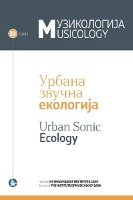
Muzikologija-Musicology
Bridging Cultures Through Academic MelodiesMuzikologija-Musicology, published by the esteemed Serbian Academy of Sciences and Arts, Institute of Musicology (SASA), serves as a pivotal platform for scholarly discourse in the field of musicology. With its ISSN 1450-9814 and E-ISSN 2406-0976, this open-access journal has been committed to disseminating high-quality research since 2002, making significant contributions to the understanding and analysis of music in diverse cultural contexts. Located in Belgrade, Serbia, the journal proudly holds a Q2 ranking in the Music category for 2023, reflecting its high-impact contributions as evidenced by its Scopus rank of #136/180 and a percentile of 24th. Covering a wide array of topics within music, from ethnomusicology to music theory and history, it invites contributions that push the boundaries of music research. By fostering an open-access model, Muzikologija-Musicology aims to ensure that its findings are accessible to a global audience, thereby enriching the discourse and fostering collaboration in the musicology community.
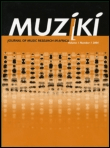
Muziki-Journal of Music Research in Africa
Illuminating the Intersections of Music and Society in AfricaMuziki - Journal of Music Research in Africa is a leading publication dedicated to exploring the rich tapestry of music research across the African continent. Published by Routledge Journals, Taylor & Francis Ltd, this journal has been at the forefront of scholarly discourse since its inception in 2004, providing a platform for innovative and interdisciplinary approaches to the study of music. With an ISSN of 1812-5980 and E-ISSN of 1753-593X, it ensures wide accessibility to both print and digital audiences. As of 2023, it holds a prestigious Q3 ranking in the field of Music, reflecting its commitment to quality scholarship and the promotion of diverse musical narratives. Muziki is particularly invaluable for researchers, professionals, and students seeking to deepen their understanding of African musicology and its socio-cultural relevance. The journal publishes original research articles, reviews, and critical essays, highlighting contemporary developments and historical contexts in music research. With a Scopus rank of 59/180 in the Arts and Humanities Music category, it stands as a respected source for advancing knowledge and fostering dialogue within the global music community.
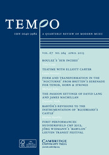
TEMPO
Where Tradition Meets Contemporary Music DiscourseTEMPO, a renowned journal published by Cambridge University Press, is dedicated to the expansive field of music studies. With its rich history dating back to 1939, the journal has significantly evolved, offering researchers, professionals, and students a platform to explore diverse musical perspectives and innovations. Serving as a vital resource in its category, TEMPO is currently positioned in the Q2 quartile within the field of Music, reflecting its quality and academic influence. Although it operates under a traditional subscription model, its impactful contributions to music scholarship are underscored by its active engagement with contemporary issues in musicology, performance, and education. Researchers can rely on TEMPO for cutting-edge analyses, reviews, and critical discourse that shape the understanding of music in society.
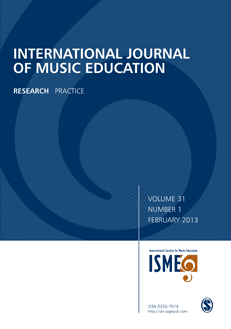
International Journal of Music Education
Championing research that resonates in classrooms worldwide.The International Journal of Music Education is a premier academic platform published by SAGE Publications Ltd, dedicated to exploring the interdisciplinary intersections of music and education. With its ISSN 0255-7614 and E-ISSN 1744-795X, this esteemed journal has been contributing significantly to the field since 1996 and will continue to do so through 2024, underscoring its commitment to advancing scholarly discourse in music pedagogy. It boasts impressive ranking metrics, including Q1 status in Music and Q2 in Education as of 2023, reflecting its influence within these domains. Ranked #10 out of 180 in Music (94th percentile) and #501 out of 1543 in Education (67th percentile) by Scopus, the journal is acknowledged for its rigorous peer-reviewed articles that address contemporary issues, innovative teaching strategies, and the role of music in learning environments. Although it does not offer open access, researchers, professionals, and students are encouraged to engage with its comprehensive research findings, ensuring the advancement of both music education and the broader arts landscape.

Problemy Muzykalnoi Nauki-Music Scholarship
Enhancing Understanding of Music's Diverse DimensionsWelcome to Problemy Muzykalnoi Nauki-Music Scholarship, a leading journal in the field of music scholarship published by the esteemed Gnesin Russian Academy of Music. With an ISSN of 2782-358X and an E-ISSN of 2782-3598, this Open Access journal has been committed to the dissemination of high-quality research since 2009, making scholarly work accessible to a global audience. Covering diverse aspects of music theory, history, and its socio-cultural impacts, Problemy Muzykalnoi Nauki serves as an essential platform for scholars, educators, and practitioners in the arts and humanities, as well as in social sciences related to music education. While its Scopus coverage was discontinued in 2021, the journal remains influential, holding a rank of #48 in the Arts and Humanities category and a percentile of 67th, showcasing its relevance and rigor in the discipline. We invite researchers and students alike to explore the rich contributions made within these pages, fostering a deeper understanding and appreciation of music in contemporary society.
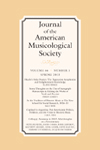
JOURNAL OF THE AMERICAN MUSICOLOGICAL SOCIETY
Advancing musicology through rigorous scholarship.JOURNAL OF THE AMERICAN MUSICOLOGICAL SOCIETY, published by University of California Press, is a prestigious peer-reviewed journal dedicated to advancing the field of musicology. With an ISSN of 0003-0139 and E-ISSN 1547-3848, this journal has been a cornerstone of scholarly communication since its inception in 1970 and continues to be relevant through 2024. Its esteemed standing is reflected in its Q2 ranking in the Music category and a respectable 71/180 ranking in the Arts and Humanities discipline, placing it in the 60th percentile among its peers. The journal provides an essential platform for researchers, professionals, and students to explore diverse topics in musicology, ranging from historical studies to contemporary analyses. While it does not currently offer Open Access options, its rigorous editorial standards ensure the publication of high-quality research that contributes significantly to the academic dialogue in music studies. With its address based in the United States at 155 Grand Ave, Suite 400, Oakland, CA 94612-3758, the journal remains a vital resource for those seeking to deepen their understanding of the complexities of music and its societal impacts.

INTERNATIONAL REVIEW OF THE AESTHETICS AND SOCIOLOGY OF MUSIC
Unveiling the Aesthetic Dimensions of Musical ExperienceThe INTERNATIONAL REVIEW OF THE AESTHETICS AND SOCIOLOGY OF MUSIC, published by the Croatian Musicological Society, is a pivotal scholarly journal dedicated to the intricate intersection of music, aesthetics, and sociology. With a special focus on exploring the cultural and social dimensions of music, this journal serves as a platform for researchers, professionals, and students alike to disseminate innovative ideas and transformative research. Although it operates under a traditional access model, the journal's impact within the field of music studies is underscored by its commendable Scopus ranking in the Q3 category and its established history from 2009 to 2016, with a renewed focus from 2018 to 2023. With an ISSN of 0351-5796, it continues to shape academic discourse with its insightful contributions and is essential for those aiming to engage deeply with the evolving dynamics of music in society.
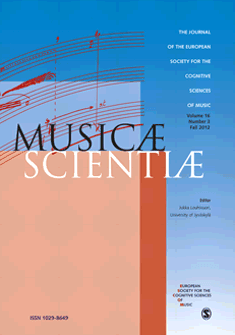
MUSICAE SCIENTIAE
Unveiling the Psychological Dimensions of Musical ExperienceMUSICAE SCIENTIAE, published by SAGE Publications Ltd, is a prestigious interdisciplinary journal situated at the intersection of music and psychological studies. Established in 1997, this journal has garnered an impressive reputation, as evidenced by its 2023 Scopus rankings, where it ranks #2 in Music (Arts and Humanities) and #51 in Experimental and Cognitive Psychology. With a considerable impact factor and categorized in the Q1 and Q2 quartiles, it stands as a key resource for researchers, students, and professionals interested in the cognitive processes related to music engagement and its applications. Although it does not operate under an open access model, MUSICAE SCIENTIAE provides valuable insights and empirical studies that contribute to the ever-evolving understanding of music's impact on human behavior and cognition. By fostering a robust platform for scholarly dialogue, this journal continues to significantly influence research and practice within its fields.